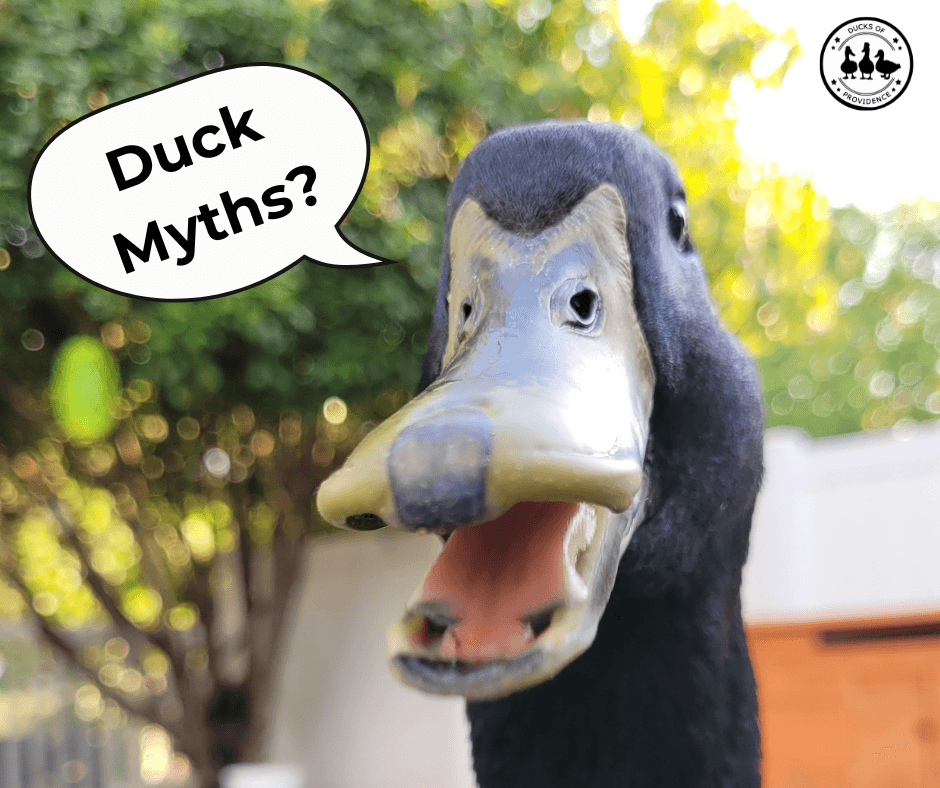
11 Duck Myths And The Surprising Truth Behind Them
Last updated on January 15th, 2026 at 01:54 pm
Ducks are one of the most fascinating creatures, with their unique behaviors and remarkable adaptations to the water. However, with so many myths circulating about these charming birds, it can be easy to misunderstand their true nature. From the idea that they’re always wet and love the rain to the belief that they don’t need water at all, it’s time to set the record straight. In this post, we’ll be busting some of the most common duck myths, helping you get a clearer, more accurate picture of what it really means to care for and understand these remarkable waterfowl. So, let’s dive in and uncover the truth behind these misconceptions!
Duck Myth 1: It’s Okay to Feed Ducks Bread
Ah, the classic scene: a park bench, a family, and a loaf of bread being tossed to eager ducks. It’s a heartwarming picture, but unfortunately, it’s built on a misconception that can harm ducks in the long run. Let’s bust this myth and explain why bread is a no-go for our feathered friends.

The Reality
Feeding bread to ducks is like giving them junk food. Bread is high in carbohydrates but lacks the essential nutrients ducks need to thrive. A diet heavy in bread can lead to malnutrition, especially in ducklings, who require a balanced diet to grow healthy and strong. Think of it like this: if you ate nothing but candy, you’d feel full, but your body wouldn’t get the vitamins and minerals it needs. Ducks feel the same when they eat bread.
Health Issues Linked to Bread
- Angel Wing: A condition where a duck’s wing joints develop improperly, causing the feathers to stick out at odd angles. It’s often linked to a poor diet, including too many carbs like bread.
- Obesity: Yes, ducks can get overweight, and bread contributes to this by being calorie-dense but nutritionally void.
- Pollution: Leftover bread in ponds can rot, leading to water pollution that harms not just ducks but the entire ecosystem.
Better Alternatives
If you’re visiting a park and want to feed the ducks, here are some safe and nutritious options:
- Peas and Corn: Thawed frozen peas or corn kernels are a duck favorite.
- Lettuce: Chopped leafy greens like romaine or kale are excellent choices.
- Oats or Barley: Uncooked, whole grains provide a nice treat.
Always remember to feed in moderation and scatter the food rather than throwing it in one spot to avoid overcrowding.
Why This Myth Persists
Feeding bread to ducks has been a long-standing tradition, often passed down through generations. Many people simply don’t realize the harm it can cause. Plus, ducks seem so eager to eat bread, it’s easy to assume it’s good for them.
Spread the Word
Next time you see someone feeding bread to ducks, consider gently sharing this information. Ducks deserve a healthy diet, and with your help, we can replace this myth with better habits.
➡️ Read more about healthy snacks for ducks
Have you witnessed this myth in action? What’s your go-to duck-friendly treat? Let’s keep the conversation going in the comments!
Duck Myth 2: Ducks Don’t Have Nerves in Their Feet
Have you ever watched a duck stand calmly on ice or paddle in freezing water and thought, Wow, their feet must be numb!? This common misconception has led many to believe that ducks don’t have nerves in their feet. But that’s not true! Ducks do have nerves in their feet, and their ability to thrive in icy conditions is thanks to incredible biological adaptations—not the absence of nerves. Let’s dive into the truth behind this myth.

The Truth About Duck Feet
Ducks’ feet are far from nerve-free. In fact, nerves play a critical role in their daily survival:
- Sensory Perception: Ducks rely on nerves to detect changes in temperature, pressure, and texture, which helps them navigate various terrains and stay safe.
- Motor Control: The nerves control muscles and tendons in their feet, ensuring precise movements for swimming, balancing, and walking.
- Temperature Regulation: Nerves work with blood vessels in their feet to help regulate body temperature using a counter-current heat exchange system.
Why the Myth Exists
This myth likely stems from ducks’ seemingly effortless ability to handle cold conditions without distress. The secret lies in their biological adaptations:
- Reduced Nerve Sensitivity: In extreme cold, the sensitivity of nerves in duck feet decreases. This helps prevent discomfort while allowing them to move freely.
- Heat Exchange System: Ducks have a built-in counter-current heat exchange system in their legs. Warm blood flowing down from their body transfers heat to the cooler blood returning from their feet. This minimizes heat loss and keeps their core warm while reducing nerve overstimulation in the feet.
Busting the Myth
While ducks can tolerate icy surfaces and freezing water, their feet are not numb or immune to pain. Instead, their remarkable physiology allows them to function optimally in harsh environments. Recognizing this complexity dispels the idea that their feet are “nerve-free.”
Why It Matters
Understanding the truth about duck feet helps us care for them better:
- Injury Awareness: Ducks can feel pain or injury in their feet, even though they tolerate cold better than we do. Bumblefoot, cuts, or frostbite are real risks if proper care isn’t taken.
- Proper Surfaces: Providing clean, safe surfaces in enclosures reduces the likelihood of foot injuries and infections.
The Bottom Line
Ducks’ feet are evolutionary masterpieces, equipped with nerves that make them both sensitive and resilient. The next time you see a duck gliding across ice or standing serenely in snow, remember—they’re not impervious to the cold. Instead, their feet are finely tuned for survival in ways that are nothing short of amazing.
Have you ever marveled at a duck’s icy adventures? Share your thoughts or questions in the comments!
Duck Myth 3: Ducks Don’t Need Water
Can ducks live without water? This persistent myth claims that ducks can thrive without access to water for swimming or splashing. While ducks can survive with limited water, they absolutely need water to stay healthy and happy. Let’s wade into the truth about why water is essential for ducks.
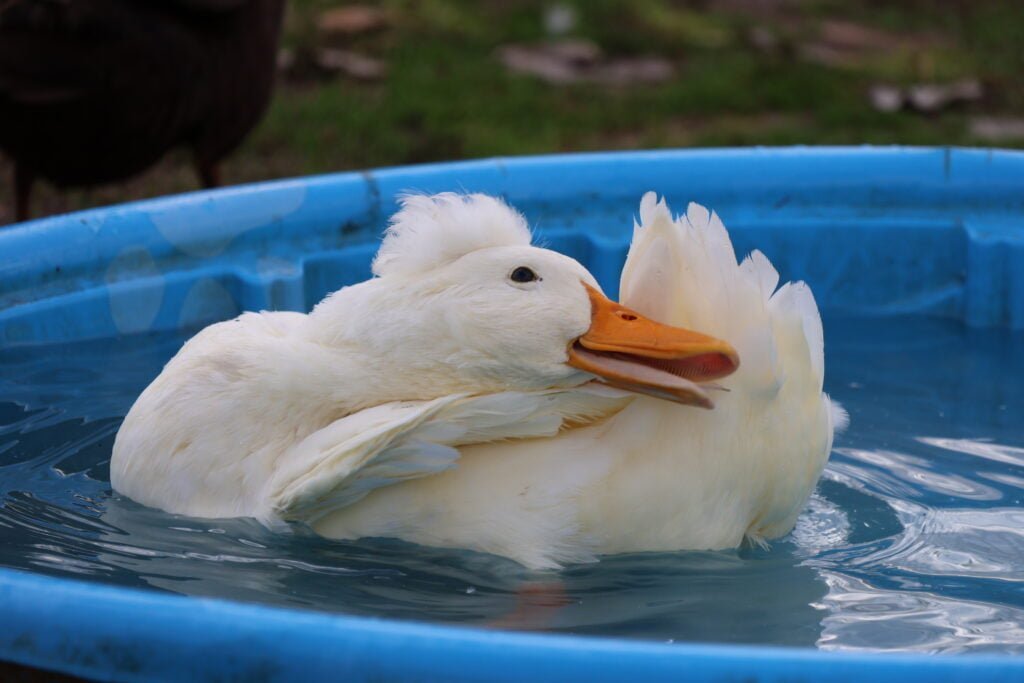
The Importance of Water for Ducks
Water is central to a duck’s health, hygiene, and overall well-being. Here’s why:
- Feather Maintenance: Ducks rely on water to keep their feathers clean and properly preened. Preening helps distribute natural oils from their uropygial gland, which waterproofs their feathers and insulates them from the cold. Without water, their feathers can become dirty, damaged, and less effective at keeping them warm and dry.
- Eye and Nostril Cleaning: Ducks dip their heads in water to clear debris from their eyes and nostrils. Without water, their respiratory health can suffer, and their eyes may become irritated or infected.
- Natural Behavior: Ducks are waterfowl by nature. Access to water allows them to engage in instinctive behaviors like dabbling, swimming, and splashing. Depriving ducks of water limits these natural behaviors, which can lead to stress and poor quality of life.
Can Ducks Live Without Swimming Water?
While ducks don’t have to swim to survive, access to water deep enough for them to dunk their heads is non-negotiable for their health. Ideally, ducks should also have a place to splash and bathe, even if it’s a small kiddie pool or water trough. Swimming water helps them exercise, cool down in hot weather, and stay clean.
Why This Myth Persists
This myth likely persists because some people raise ducks in environments without swimming water, such as in dry agricultural settings where ducks are kept primarily for eggs or meat. While these ducks may survive, they don’t thrive—and they’re more prone to health issues like dirty feathers, heat stress, and eye infections.
Why Water Matters for Pet Ducks
For pet ducks, water is essential not just for survival, but for ensuring a happy and healthy life. As duck owners, we should strive to provide:
- Clean Water: Ducks need fresh, clean water for drinking and bathing. Stagnant or dirty water can lead to illness.
- Accessible Pools: Even a small pool or trough can go a long way in meeting a duck’s needs.
- Daily Cleaning: Ducks love to muddy their water, so regular cleaning is key to keeping their environment hygienic.
The Bottom Line
Ducks are water-loving creatures, and their lives are enriched by access to water. While they can technically live without swimming water, they truly thrive when given the opportunity to splash, swim, and clean themselves.
➡️ Read more about ducks and water
Do your ducks have a favorite water spot? Let us know in the comments how you keep your feathered friends hydrated and happy!
Duck Myth 4: All Ducks Are Monogamous for Life
Thanks to romanticized depictions of waterfowl like swans, many people believe all ducks form lifelong monogamous bonds. While this idea paints a sweet picture, it’s not accurate for most duck species. Ducks have a wide variety of mating behaviors, and lifelong monogamy is the exception, not the rule. Let’s break down the truth about duck relationships.
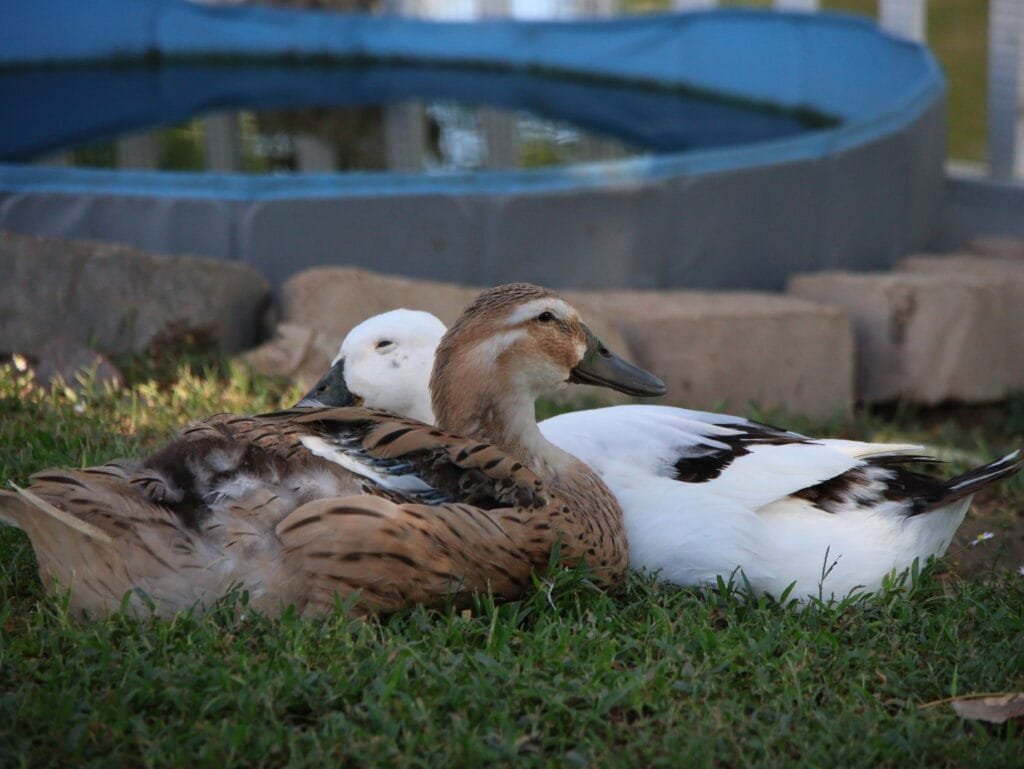
The Reality of Duck Pairing
Ducks exhibit different types of mating systems depending on their species:
- Seasonal Monogamy: Many duck species, such as Mallards, form monogamous bonds for a single breeding season. These pairs stay together through courtship, mating, and nesting but typically part ways after the ducklings hatch.
- Polygamy: Some ducks, like domestic breeds and Muscovy ducks, often engage in polygamous behavior, with males mating with multiple females.
- Rare Lifelong Monogamy: Only a few waterfowl species, such as some geese and swans, truly mate for life. Even then, if one partner dies, the survivor may seek a new mate.
Why the Myth Exists
This myth likely stems from the behavior of a few monogamous waterfowl species being generalized to all ducks. In reality, most duck relationships are temporary, with pairs forming only for a season to ensure successful breeding and then dissolving as the ducks prepare for migration or molt.
The Unique Case of Domestic Ducks
In domestic settings, ducks often don’t follow typical wild mating patterns. Domestic drakes may mate with multiple females in one flock, and some breeds may even show signs of preference for certain partners. However, these behaviors are influenced more by environment and social dynamics than by innate monogamous tendencies.
Why It Matters
Understanding ducks’ natural mating behaviors can help duck owners better manage their flocks:
- Prevent Overbreeding: In mixed-gender flocks, drakes may attempt to mate with several females, potentially leading to stress or injury for the hens.
- Flock Harmony: Providing a proper male-to-female ratio (1 drake for every 4–6 hens) helps maintain peace and reduces excessive mating behavior.
- Healthy Relationships: Ducks don’t need to be “paired off” to be happy. They thrive in well-balanced flocks where their social and environmental needs are met.
The Bottom Line
While the idea of ducks mating for life is charming, it’s not the reality for most species. Ducks have diverse and fascinating mating habits that suit their needs in the wild. By understanding these behaviors, we can better care for our flocks and appreciate the variety of duck relationships.
Have you noticed unique pairing behaviors in your ducks? Share your experiences in the comments!
Duck Myth 5: Ducks Are Dirty Animals
It’s a common misconception that ducks are inherently dirty, messy creatures. While it’s true that ducks can create a bit of a splash (literally), labeling them as “dirty” isn’t fair. Ducks are actually quite clean and have fascinating habits to keep themselves that way—with a little help from their environment. Let’s quash this myth and set the record straight!

Why Ducks Get a Bad Rap
- Water Enthusiasm: Ducks love water, and their constant splashing, dabbling, and bathing can muddy their surroundings. A wet, messy area can give the impression that ducks themselves are dirty.
- Pooping Patterns: Ducks don’t control when or where they poop, and since they’re grazing animals, they do it frequently. This natural behavior can make their environment appear messy if not properly managed.
- Mud and Foraging: Ducks enjoy dabbling in mud for food, often coating their bills or feet in dirt. However, this is just part of their foraging process—not a sign of poor hygiene.
The Truth About Ducks and Cleanliness
Ducks are surprisingly meticulous when it comes to their personal hygiene:
- Daily Preening: Ducks spend a significant portion of their day preening, which involves carefully cleaning and oiling their feathers. This process keeps their plumage waterproof, insulating, and in top condition.
- Bathing Rituals: Ducks need access to water for bathing. They splash, dunk, and submerge themselves to clean off dirt, debris, and parasites.
- Instinctive Tidiness: Ducks instinctively avoid fouling their nests, keeping the spaces where they sleep and lay eggs as clean as possible.
What Makes Ducks Messy
While ducks themselves are clean, their living areas can get messy if not properly managed. Here’s how to keep things under control:
- Provide Proper Drainage: Ducks splash water everywhere, so ensure their water area drains well to prevent mud buildup.
- Clean Regularly: Pools, water troughs, and bedding should be cleaned frequently to prevent odors and bacteria.
- Rotational Grazing: If your ducks free-range, rotate their grazing areas to prevent overuse and maintain a tidy yard.
Why It Matters
Understanding that ducks aren’t dirty helps us better care for them:
- Respect Their Needs: Ducks need access to clean water and dry spaces for their health and happiness.
- Improve Perception: By debunking this myth, we can encourage others to appreciate ducks as clean, charming animals.
The Bottom Line
Ducks are not dirty animals—they’re simply water-loving, active creatures whose behaviors sometimes get misinterpreted. With proper care and management, they can be happy, healthy, and surprisingly clean feathered friends.
Do you have tips or tricks for keeping your duck spaces clean? Share your ideas in the comments below!
Duck Myth 6: Ducklings Can Swim Immediately After Hatching
It’s easy to picture newly hatched ducklings diving into the water, paddling effortlessly like pros. After all, they’re ducks, right? While ducklings are naturally inclined to swim, the idea that they’re fully equipped for aquatic life immediately after hatching is a myth. Let’s explore the reality behind this adorable assumption.

The Truth About Duckling Swimming
- Born with Instincts, Not Skills
Ducklings are born with a natural instinct to swim, but that doesn’t mean they’re ready for extended water adventures. Their little bodies need time to grow strong enough to handle long swims. - No Waterproof Feathers Yet
Unlike adult ducks, ducklings don’t have the waterproof feathers necessary to stay dry and warm. Their down is soft and fluffy but absorbs water easily. Until they develop adult plumage, prolonged exposure to water can lead to chilling or drowning. - Relying on Mom’s Oils
In the wild, mother ducks preen their ducklings with oil from their own glands, giving the babies some temporary water resistance. Without this, domestic ducklings are especially vulnerable in water.
Safe Swimming for Ducklings
If you want to let your ducklings swim, it’s crucial to ensure their safety:
- Supervised Sessions: Always supervise swimming to prevent exhaustion or drowning.
- Shallow Water: Use a shallow container where they can stand and paddle without submerging completely.
- Warm Conditions: Ensure the water and environment are warm to avoid chilling.
- Drying Off: After swimming, dry the ducklings thoroughly and return them to a warm, dry brooder.
When Are Ducklings Ready for Full Swimming?
Ducklings are fully ready for swimming when they:
- Have developed waterproof feathers (usually around 6–8 weeks old).
- Are large and strong enough to paddle confidently in deeper water.
Why This Myth Matters
Believing this myth can lead to unintentional harm:
- Overexposure Risks: Prolonged swims in cold or deep water can lead to hypothermia or exhaustion.
- Misunderstanding Their Needs: Ducklings require a balance of supervised swimming and dry, warm environments for healthy development.
The Bottom Line
While ducklings are born with the instincts to swim, they need time, growth, and careful supervision to enjoy the water safely. Understanding their developmental needs ensures they grow into the confident swimmers they’re destined to be.
➡️ Learn more about ducklings and water
Have you introduced your ducklings to water? Share your experiences and tips for safe swimming in the comments below!
Duck Myth 7: Ducks Are Not Social Animals
It’s a common misconception that ducks are solitary creatures that thrive on their own. In reality, ducks are highly social animals with complex social structures and behaviors. Let’s dive into the truth about their social nature and why companionship is essential for their well-being.
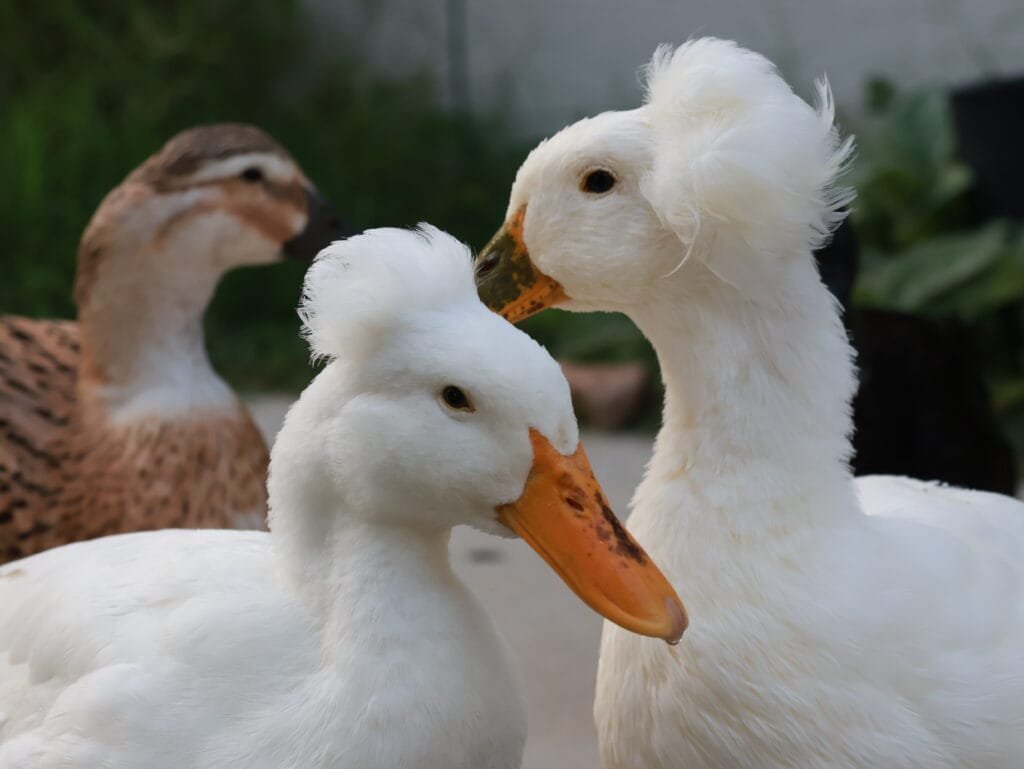
Ducks Are Flock Animals
Ducks naturally form flocks, whether in the wild or in domestic settings. This social tendency provides several key benefits:
- Protection: In the wild, being in a flock helps ducks detect predators and stay safe.
- Communication: Ducks use vocalizations and body language to convey information, from warning signals to bonding behaviors.
- Emotional Well-being: Companionship reduces stress and helps ducks feel secure, fostering a happier, healthier life.
Why Ducks Need Companions
When ducks are kept alone, they can suffer from loneliness and boredom, leading to:
- Stress and Anxiety: Ducks deprived of social interaction may exhibit signs of distress, such as excessive quacking or lethargy.
- Unhealthy Behaviors: A lack of stimulation can cause feather plucking, over-preening, or other destructive habits.
Even with attentive human caretakers, a duck’s need for interaction with its own kind cannot be entirely fulfilled. Ducks communicate and bond in ways only other ducks can truly understand.
Signs of a Healthy Flock
A happy flock of ducks will display:
- Frequent Interaction: Ducks forage, preen, and rest together.
- Playfulness: Ducks engage in water games and social bonding activities.
- Balanced Pecking Order: While some hierarchy is natural, a healthy group avoids excessive bullying.
Tips for Supporting Duck Socialization
To ensure your ducks are happy and social:
- Keep Them in Groups: Always have at least two ducks, but three or more is even better.
- Provide Enrichment: Toys, pools, and safe free-ranging opportunities encourage group activities.
- Monitor Behavior: Watch for signs of isolation or aggression and address them promptly.
Why This Myth Exists
This myth might stem from observing lone ducks in the wild, which are often misunderstood. These ducks are usually:
- Temporarily separated from their flock.
- Searching for mates during the breeding season.
In captivity, however, isolation is unnatural and detrimental to a duck’s overall well-being.
The Bottom Line
Ducks are not only social animals—they thrive on companionship. Whether foraging, bathing, or napping, ducks do it best with friends by their side. By keeping ducks in groups and supporting their social needs, you’ll ensure they live happy, fulfilled lives.
➡️ Learn more about flock compositions
What’s the most interesting behavior you’ve noticed in your flock? Let us know in the comments below!
Duck Myth 8: Ducks’ Quacks Don’t Echo
One of the most peculiar myths about ducks is the idea that their quacks don’t produce an echo. It’s a quirky claim that’s been widely shared but doesn’t hold up to scientific scrutiny. Let’s dive into the facts and uncover why this myth doesn’t quack up.

The Truth About Duck Quacks and Echoes
Ducks’ quacks, like all sounds, create sound waves that reflect off surfaces, producing echoes. There’s nothing unique about the anatomy of a duck’s quack that prevents it from echoing. So why do people think otherwise?
Why This Myth Exists
- Subtle Echoes: Duck quacks are short, low-pitched, and often have a fading quality, making their echoes harder to hear compared to sharper, louder sounds like a clap or shout.
- Environmental Factors: Ducks are often found in open areas like ponds or fields where there are few surfaces to create noticeable echoes.
- Viral Rumor: The myth gained traction as a fun, quirky fact, and it spread widely before being debunked.
Debunking the Myth with Science
In 2003, researchers at the University of Salford in England conducted experiments to test this claim. They proved that duck quacks do, indeed, echo. The challenge lies in detecting the echo, as the characteristics of the quack make it blend with the original sound.
Why This Myth Matters
While seemingly harmless, myths like this highlight the importance of questioning widely accepted “facts.” Understanding the science of sound waves can inspire curiosity and a deeper appreciation for the natural world.
The Bottom Line
Ducks’ quacks absolutely echo! The next time someone shares this quirky myth, you’ll have the knowledge to set the record straight.
➡️ Learn more facts about duck quacking
Have you noticed the unique sound of a duck’s quack in your own environment? Share your observations below!
Duck Myth 9: All Ducks Can Fly Well
When we think of ducks, the image of a graceful bird soaring through the sky often comes to mind. But did you know not all ducks are adept fliers? Let’s explore the truth about ducks and their flying abilities, busting this common myth wide open!

Ducks and Flight: The Truth
While many duck species are excellent fliers capable of covering long distances during migration, others are not built for efficient flight. Some domesticated ducks, for example, have been bred in ways that limit their flying abilities.
Ducks That Excel at Flying
Wild ducks, like Mallards, are strong fliers with:
- Powerful Wings: Designed for long migrations, often spanning hundreds or even thousands of miles.
- Light Bodies: Ideal for flight efficiency.
Smaller, lightweight ducks like Teal and Wood Ducks are also skilled at zipping through trees and wetlands.
Ducks That Struggle with Flight
Domesticated breeds, especially those bred for meat or eggs, often have limited flight abilities. Why?
- Heavier Bodies: Breeds like Pekins and Rouens are too heavy for sustained flight.
- Selective Breeding: Over generations, humans have prioritized traits like size and temperament over flight.
- Wing Clipping: In captivity, owners may clip ducks’ wings to prevent escape or injury, further limiting their ability to fly.
A Notable Exception: Muscovy Ducks
Muscovy ducks, though domesticated, retain strong flight abilities compared to other domestic breeds. They are known for their tree-perching habits and often fly short distances with ease.
Why This Myth Persists
This misconception likely arises because most people are familiar with wild ducks, which are typically skilled fliers. Observing a domestic duck struggling to take off can come as a surprise!
Why It Matters
Understanding a duck’s ability—or inability—to fly is important for proper care:
- Safety Measures: Ducks that can’t fly need secure, predator-proof enclosures.
- Exercise Alternatives: Provide space for non-flying breeds to roam and stay active.
- Preventing Escapes: Flying ducks require thoughtful planning to prevent them from wandering too far.
The Bottom Line
Not all ducks are soaring superstars, and that’s okay! Whether gliding through the sky or waddling on the ground, every duck has unique traits that make them special. If you have domestic ducks, observe their abilities and provide a safe, enriching environment tailored to their needs.
Have you ever seen a duck try to fly? Share your experiences with us below!
Duck Myth 10: Ducklings Can Survive Without Their Mother
It’s a common misconception that ducklings are independent and capable of surviving on their own shortly after hatching. While they may look surprisingly self-sufficient as they waddle around and forage, the truth is far more complex. Let’s unravel this myth and understand why mother ducks—or human caretakers—are essential for ducklings’ survival.
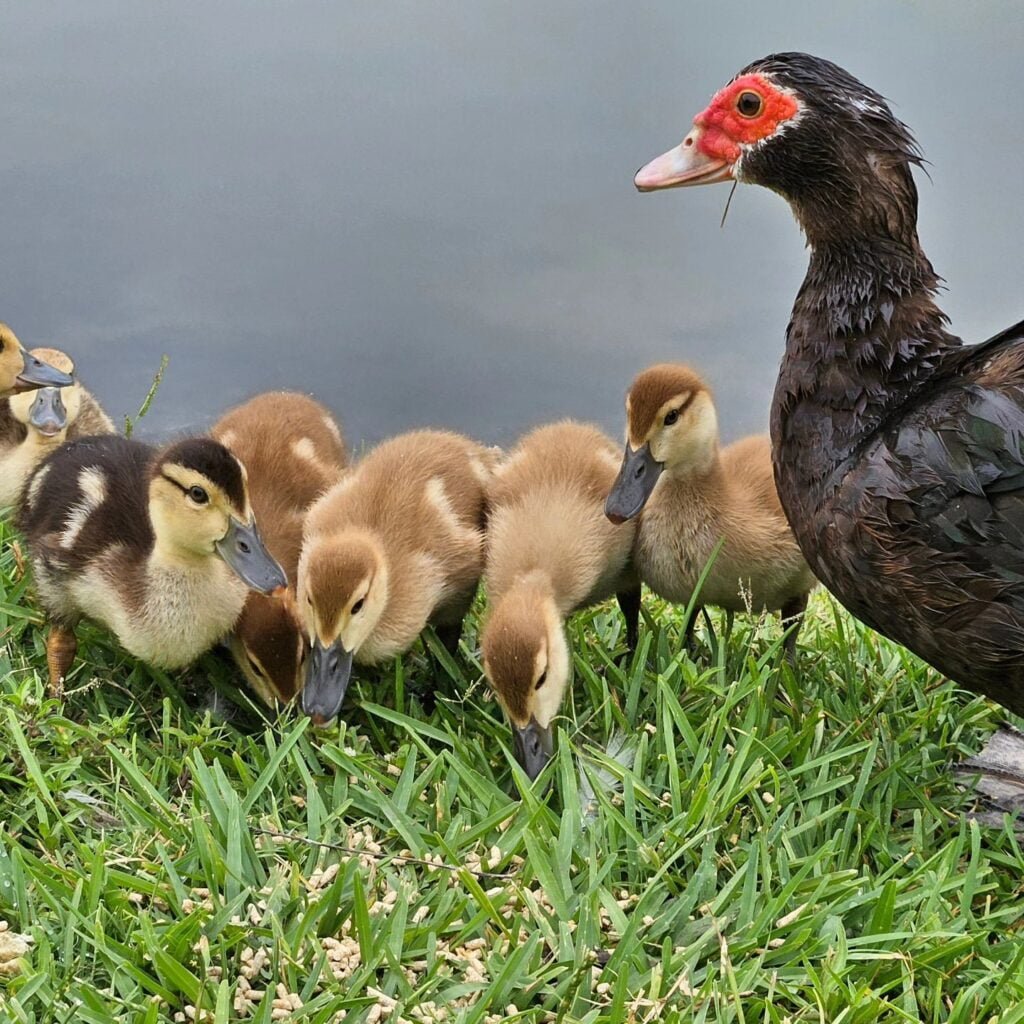
The Truth About Ducklings
Ducklings are precocial, meaning they are born with their eyes open, covered in fluffy down, and able to move around shortly after hatching. However, this does not mean they can thrive without guidance and protection.
Why Ducklings Need Their Mother
- Warmth: Newly hatched ducklings cannot regulate their body temperature. Mother ducks brood their young to keep them warm and safe from the cold.
- Protection: Ducklings are vulnerable to predators like crows, raccoons, and even domestic pets. A mother duck fiercely guards her brood, keeping them out of harm’s way.
- Guidance: Ducklings learn vital survival skills by following their mother. She teaches them where to find food, how to avoid danger, and the basics of swimming and foraging.
Can Ducklings Survive Without Their Mother?
If a duckling becomes separated from its mother, its chances of survival decrease significantly. Without warmth, food, and protection, a lone duckling is unlikely to make it past the first few days. However, with proper human intervention:
- A Brooder: A heated brooder can replace a mother’s warmth.
- Correct Diet: Ducklings require a high-protein starter feed formulated for waterfowl.
- Safe Environment: A secure enclosure keeps predators at bay.
Why This Myth Exists
The myth may stem from observing wild ducklings that seem to forage and move independently. What’s not always visible is the constant oversight of their mother, who keeps them alive and thriving.
Why It Matters
Understanding the dependency of ducklings highlights the responsibility that comes with caring for them. Whether in the wild or in a backyard setting, ducklings require significant support to grow into healthy adults.
- Avoiding Rescue Mistakes: If you find ducklings in the wild, it’s crucial to ensure they’re truly abandoned before intervening. A mother duck may simply be hiding nearby.
- Proper Care: For orphaned or pet ducklings, providing the right conditions and care is essential for their survival.
The Bottom Line
Ducklings might look independent, but their survival hinges on the care and protection of a mother figure—be it a duck or a human. Providing warmth, safety, and the right nourishment is key to ensuring they thrive.
➡️ Learn how to raise ducklings
Have you ever raised ducklings without a mother duck? Share your tips and experiences in the comments!
Duck Myth 11: Ducks Are Always Wet and Love Rain
One of the most enduring myths about ducks is that they’re always wet, and that they love to be out in the rain. While it’s true that ducks are well-adapted to water, the reality is more nuanced than this simple image of a wet, rain-loving bird. Let’s dive into the truth behind this myth!
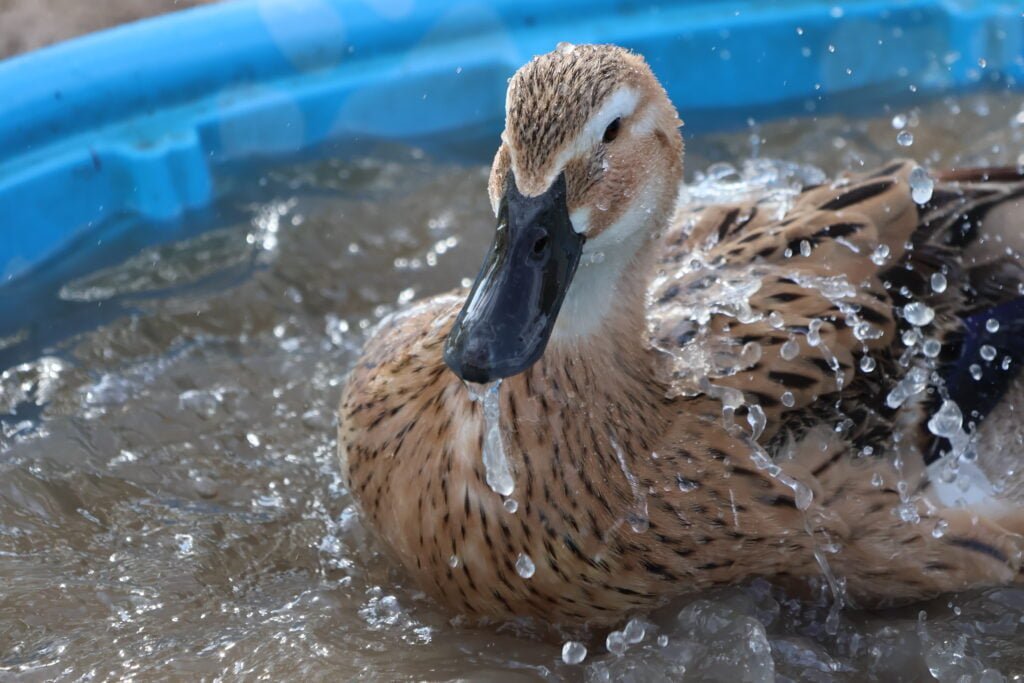
Ducks and Water: A Natural Relationship
Ducks are waterfowl, meaning they are highly adapted to living in and around water. They have specialized waterproof feathers, a natural oil produced by a gland near their tail, which helps them stay dry when swimming or splashing. Their feet, however, are not waterproof, but ducks are generally able to avoid prolonged exposure to cold water.
Why Ducks Aren’t Always Wet
- Waterproof Feathers: Ducks’ feathers are coated with oil, allowing them to repel water while swimming. This is why they can stay dry even when they dive into ponds or lakes. However, their feathers need regular preening to maintain this water-repellent layer.
- Comfortable and Dry on Land: Ducks enjoy water, but they also enjoy dry land to rest, forage, and preen. They’ll often find a warm, dry spot to relax, where they can fluff up their feathers and stay cozy.
Do Ducks Love Rain?
While it’s true that ducks are well-suited for wet conditions, it doesn’t necessarily mean they love being in the rain.
- Comfort vs. Necessity: Ducks are equipped to handle rain, but that doesn’t mean they’re always enthusiastic about being out in a downpour. Many ducks will seek shelter or stay under trees when it rains heavily.
- Behavior in Wet Weather: Ducks can still be seen out in the rain, but they often prefer a break from it. They’ll retreat to their shelter, especially if the rain is accompanied by wind or extreme cold.
Why This Myth Exists
The myth likely comes from seeing ducks swimming or playing in the rain, and associating it with enjoyment. Ducks do indeed appear to thrive in wet environments, but they also appreciate comfort and safety, just like any other animal.
Why It Matters
Understanding ducks’ relationship with water helps ensure their well-being:
- Shelter in Bad Weather: Ducks still need shelter from extreme weather conditions, such as heavy rain or snow.
- Comfort and Dryness: While ducks enjoy water, providing dry spaces for rest and warmth is essential for their health.
- Health Risks: Prolonged exposure to wet conditions can lead to issues like hypothermia or wet feathers, which may make them more vulnerable to illness.
The Bottom Line
While ducks are wonderfully adapted to wet conditions and love to swim, they’re not always wet and don’t necessarily revel in heavy rain. Their waterproof feathers help them stay dry, but they also enjoy the comforts of dry land and shelter. So, next time it rains, don’t assume your ducks are out there dancing in delight—they might be tucked away, staying dry and cozy!
How do your ducks react to rainy weather? Do they like it, or prefer to stay inside? Let us know!
In conclusion, ducks are fascinating creatures with unique needs and behaviors that often get misunderstood due to widespread myths. By debunking these common misconceptions, we gain a deeper understanding of how to properly care for them and appreciate their true nature. Whether it’s recognizing that they need water for more than just swimming, or understanding their complex social structures, the truth about ducks is far more interesting than the myths. As duck lovers, it’s our responsibility to provide them with the care they truly need, based on facts, not fiction. So the next time you encounter a duck myth, take a moment to think—what’s the truth behind it? Your ducks will thank you for it!
